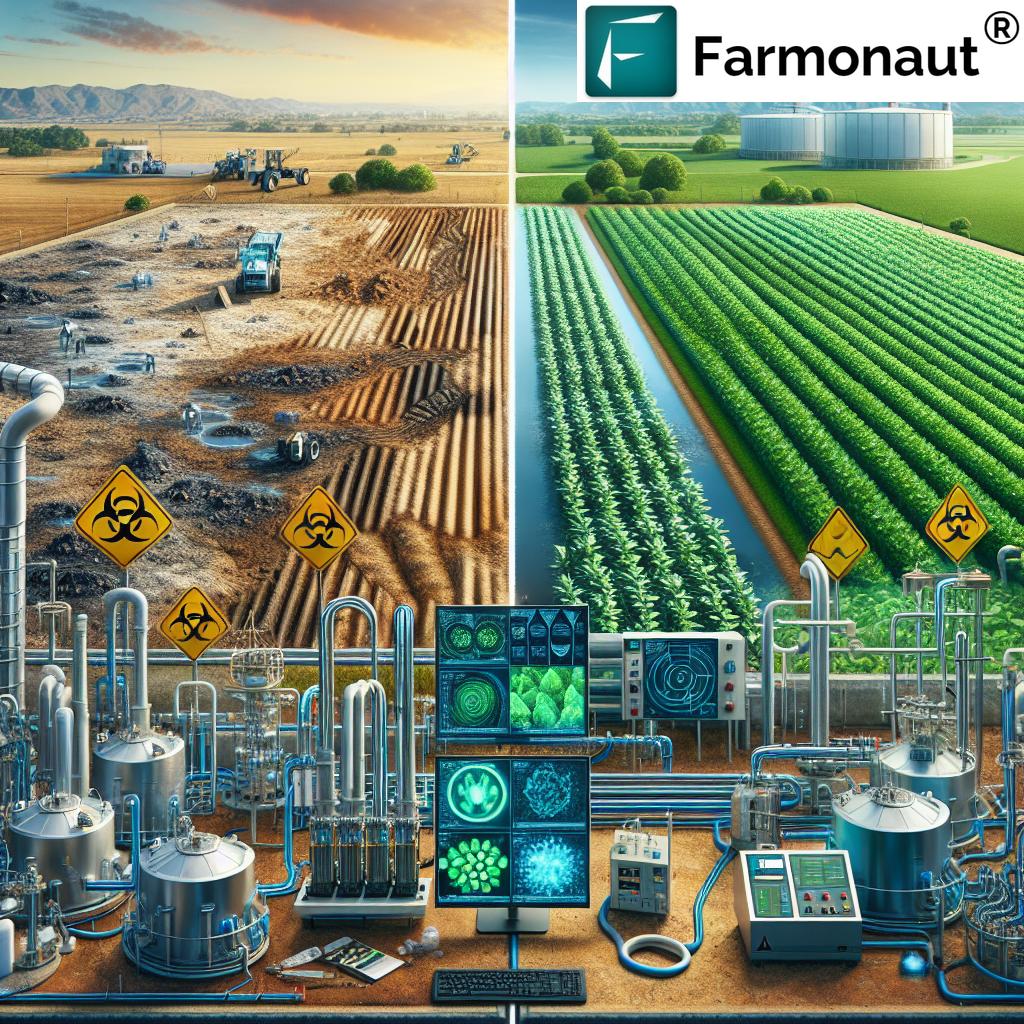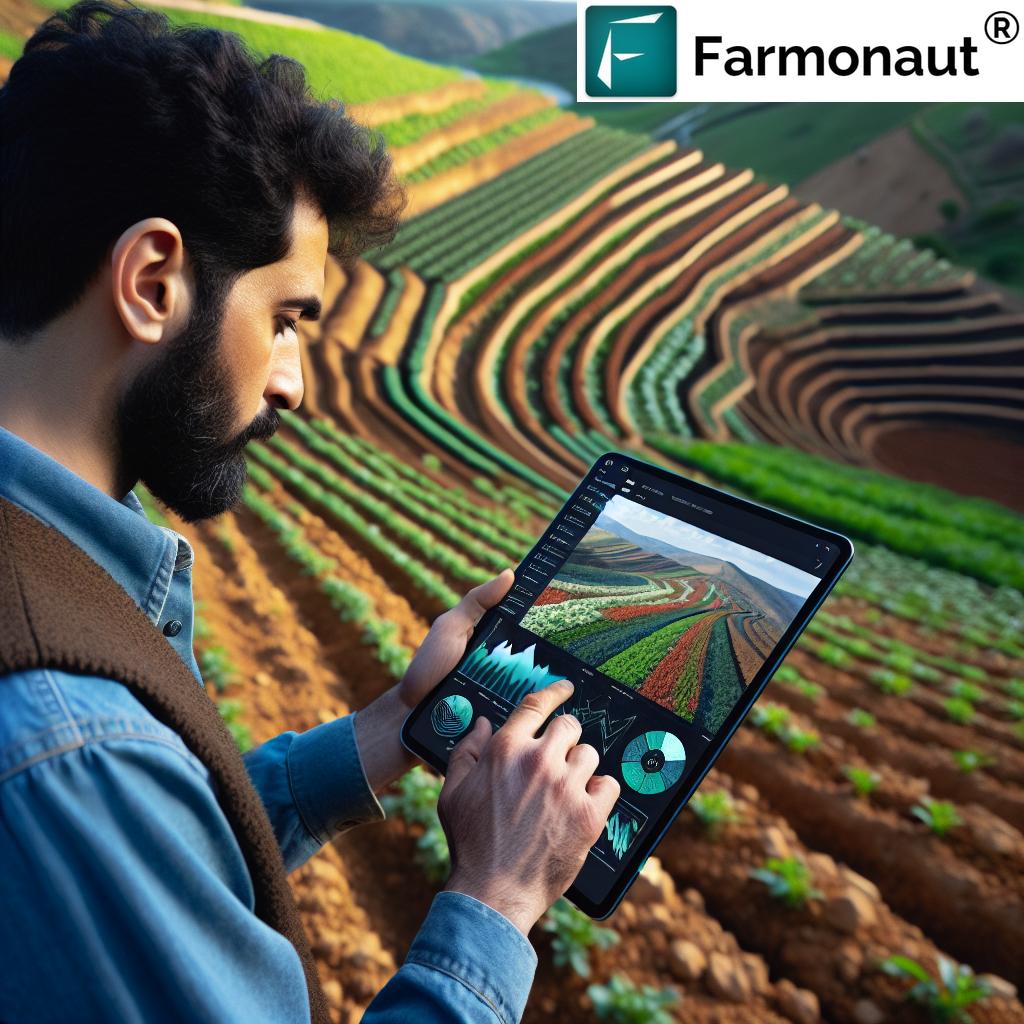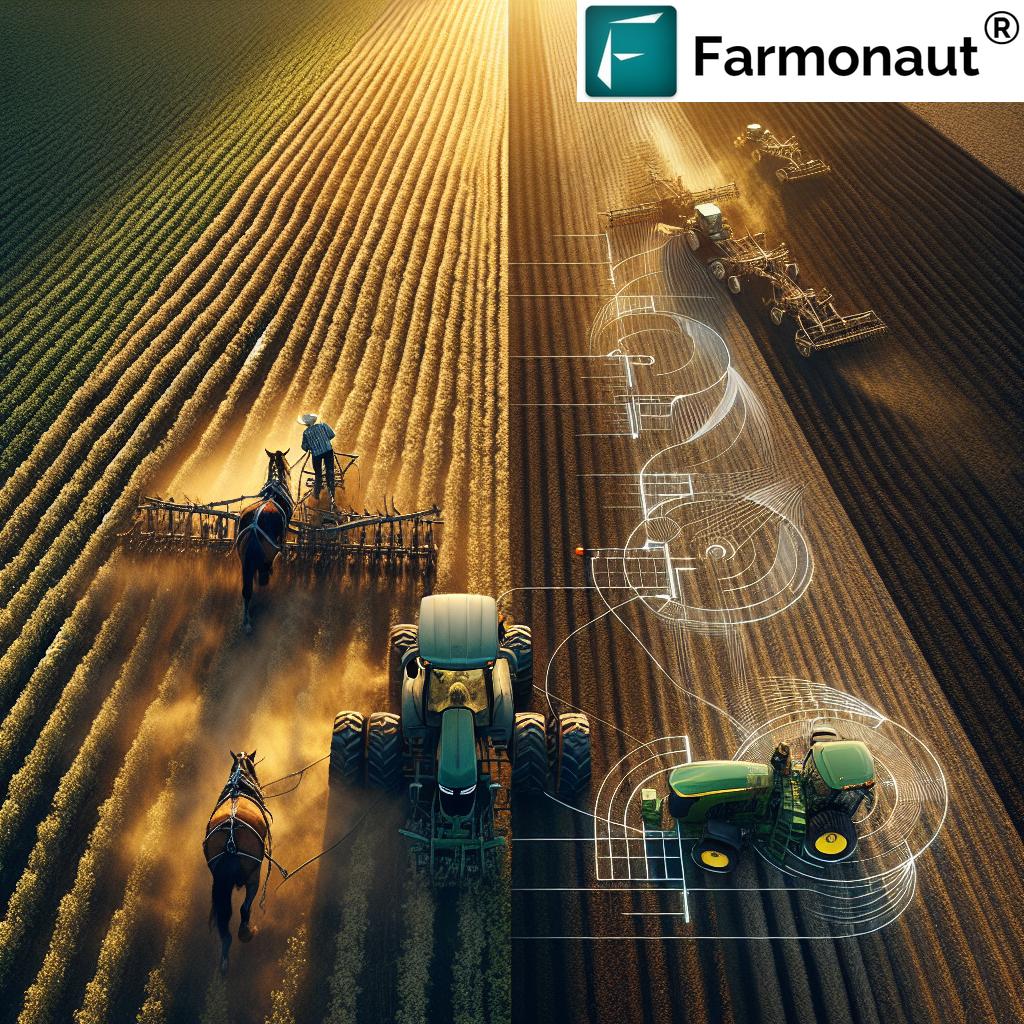Revolutionizing Georgia’s Rural Farms: How Precision Agriculture Technology Transforms Sustainable Farming Practices
“Precision agriculture technology has increased crop yields by up to 30% in rural Georgia farms.”
In the heart of rural Georgia, a profound transformation is taking place. As we bid farewell to a global humanitarian and champion of sustainable farming practices, we reflect on the legacy that continues to shape the agricultural landscape of this southern state. From the plains of Georgia to the global stage, we trace the journey of a visionary who transformed from a humble farmer to an advocate for precision agriculture technology and smallholder farmer solutions.
The recent passing of Jimmy Carter, the 39th President of the United States, at the age of 100, marks not just the end of an era but also highlights the ongoing revolution in Georgia’s rural farms. Carter’s commitment to sustainable farming practices and rural agricultural development laid the groundwork for the technological advancements we see today.
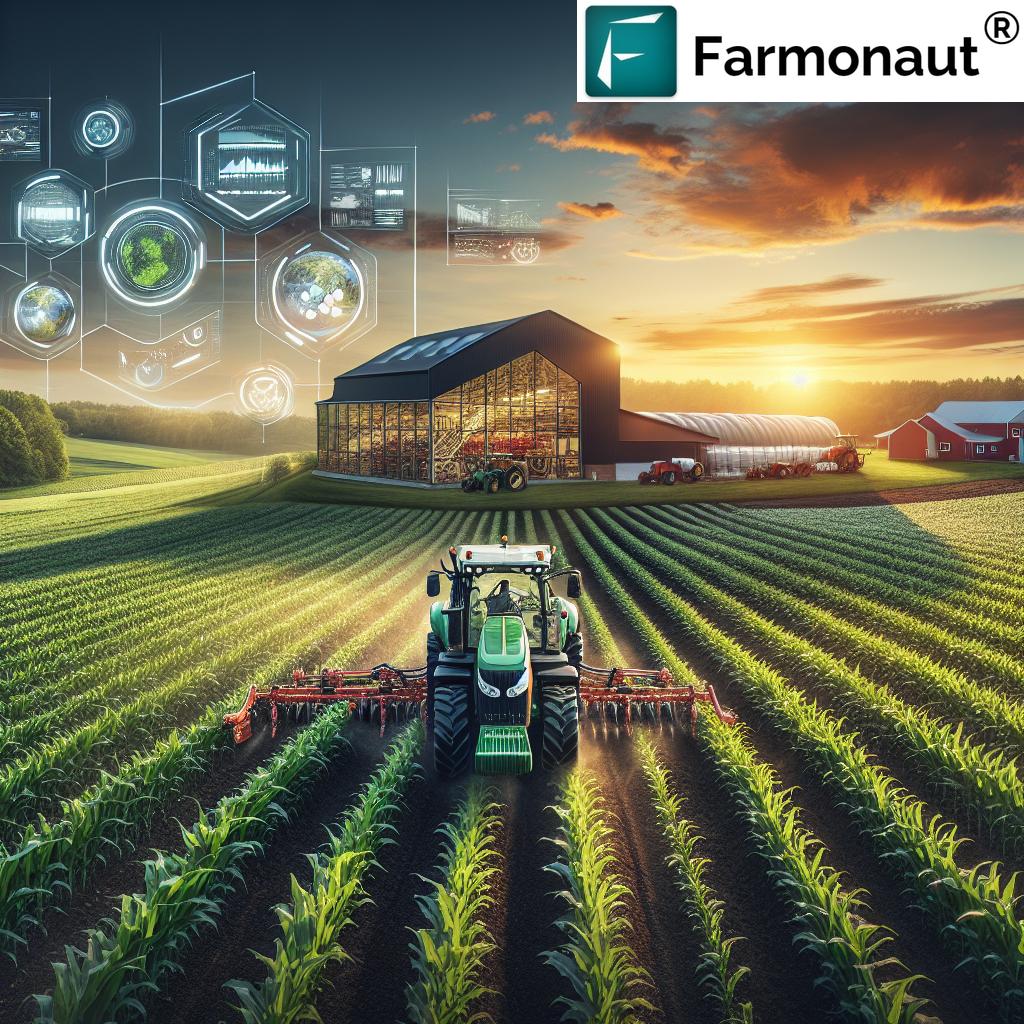
The Legacy of a Farmer-President
Jimmy Carter’s journey from a peanut farmer in Plains, Georgia, to the White House and back to his roots as a global humanitarian exemplifies the deep connection between rural America and the wider world. His efforts in promoting sustainable farming practices and human rights have set the stage for the current revolution in precision agriculture technology.
As we reflect on Carter’s legacy, we see how his vision aligns with the current trends in farm management software and climate-smart agriculture. The small town of Plains, which has remained relatively unchanged since Carter’s birth, now stands as a symbol of how rural communities can embrace technological advancements while maintaining their core values.
The Rise of Precision Agriculture in Georgia
In recent years, Georgia’s agricultural sector has witnessed a significant shift towards precision agriculture technology. This transformation is not just about adopting new tools; it’s about reimagining the entire approach to farming in the rural South.
- Satellite-based crop monitoring
- AI-driven farm advisory systems
- Smart irrigation systems
- Soil health monitoring technologies
- Agricultural drone applications
These technologies are not just improving yields; they’re revolutionizing the way farmers interact with their land and resources. For instance, smart irrigation systems have shown remarkable results in water conservation.
“Smart irrigation systems can reduce water usage by 50% while maintaining optimal soil moisture levels for crops.”
Transforming Rural Agricultural Development
The impact of precision agriculture technology extends beyond individual farms. It’s reshaping rural agricultural development across Georgia and the American South. By implementing advanced farm management software and crop yield optimization techniques, even small-scale farmers are seeing significant improvements in their operations.
One company at the forefront of this revolution is Farmonaut. Their satellite-based farm management solutions are making precision agriculture accessible to farmers across Georgia. Through their web and mobile applications, farmers can monitor crop health, receive personalized advice, and optimize their resource usage.

The Role of Climate-Smart Agriculture
As Georgia faces the challenges of climate change, the adoption of climate-smart agriculture practices becomes increasingly crucial. These practices not only help farmers adapt to changing weather patterns but also contribute to mitigating greenhouse gas emissions.
Key aspects of climate-smart agriculture in Georgia include:
- Precision fertilizer application to reduce nitrous oxide emissions
- Conservation tillage to improve soil carbon sequestration
- Crop diversification to enhance resilience against pests and diseases
- Water-efficient irrigation systems to cope with drought conditions
These practices align with Carter’s vision of sustainable farming and demonstrate how modern technology can amplify the impact of long-standing agricultural wisdom.
Empowering Smallholder Farmers
One of the most significant impacts of precision agriculture technology in Georgia has been its ability to empower smallholder farmers. By providing access to advanced tools and data-driven insights, companies like Farmonaut are leveling the playing field.
Smallholder farmer solutions now include:
- Affordable satellite-based crop monitoring
- Mobile apps for real-time farm management
- AI-powered advisory services
- Community-based knowledge sharing platforms
These solutions are particularly important in rural Georgia, where many farms are family-owned and operated. They enable farmers to make informed decisions, optimize their resources, and compete in an increasingly global market.
The Impact on Crop Yield Optimization
One of the most tangible benefits of precision agriculture technology in Georgia has been its impact on crop yield optimization. By leveraging data from satellites, soil sensors, and weather stations, farmers can make highly informed decisions about planting, irrigation, and harvesting.
For example, Farmonaut’s satellite-based crop monitoring API provides farmers with detailed insights into crop health and growth patterns. This information allows for targeted interventions, such as precise application of fertilizers or early detection of pest infestations.
| Agricultural Practice | Traditional Method | Precision Agriculture Approach | Estimated Yield Improvement (%) | Estimated Water Conservation (%) | Estimated Cost Savings (%) |
|---|---|---|---|---|---|
| Irrigation Management | Scheduled watering | Smart irrigation based on soil moisture sensors | 20 | 50 | 30 |
| Crop Monitoring | Visual inspection | Satellite and drone imaging | 25 | N/A | 20 |
| Soil Health Assessment | Annual soil testing | Real-time soil nutrient monitoring | 15 | N/A | 25 |
| Pest Control | Scheduled spraying | Targeted application based on pest detection | 30 | N/A | 40 |
| Fertilizer Application | Uniform application | Variable rate application | 20 | N/A | 35 |
Advancing Soil Health Monitoring
Soil health is the foundation of sustainable agriculture, and precision technology is revolutionizing how farmers in Georgia monitor and manage their soil. Advanced soil health monitoring techniques allow for:
- Real-time analysis of soil nutrient levels
- Tracking of soil organic matter content
- Monitoring of soil microbial activity
- Assessment of soil structure and water retention capacity
These insights enable farmers to make data-driven decisions about soil amendments, crop rotation, and conservation practices, leading to long-term improvements in soil fertility and sustainability.
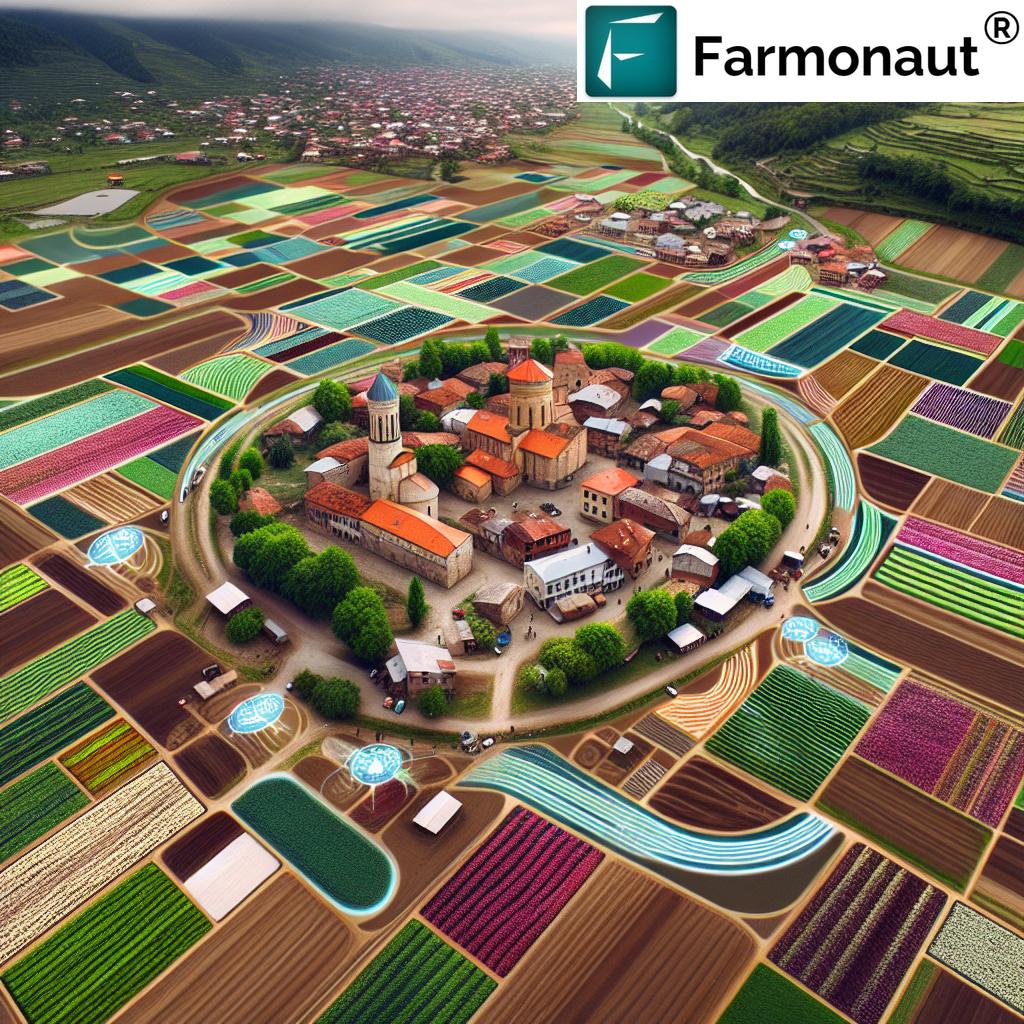
The Future of Smart Irrigation Systems
Water scarcity is a growing concern in many parts of Georgia, making efficient irrigation a top priority for farmers. Smart irrigation systems, powered by precision agriculture technology, are transforming water management on farms across the state.
Key features of these systems include:
- Real-time soil moisture monitoring
- Weather data integration for predictive watering
- Automated irrigation scheduling
- Remote control and monitoring via mobile apps
By implementing these systems, Georgia farmers are not only conserving water but also improving crop quality and reducing operational costs. Farmonaut’s platform integrates with many of these smart irrigation systems, providing a comprehensive solution for water management.
Agricultural Drone Applications: A Game-Changer
The use of drones in agriculture has rapidly expanded in Georgia, offering farmers unprecedented insights into their crops and land. Agricultural drone applications have become an integral part of precision farming practices, providing benefits such as:
- High-resolution crop imaging for early problem detection
- Precise mapping of field variations
- Targeted application of pesticides and fertilizers
- Crop yield estimation and harvest planning
These applications are particularly valuable in Georgia’s diverse agricultural landscape, from expansive peanut fields to rolling peach orchards. By integrating drone data with satellite imagery and ground-level sensors, farmers gain a comprehensive view of their operations.
The Role of Farm Management Software
At the heart of Georgia’s agricultural revolution is advanced farm management software. These digital platforms bring together data from various sources, providing farmers with a centralized hub for decision-making. Farmonaut’s API developer documentation showcases how this technology can be integrated into existing farm management systems.
Key features of modern farm management software include:
- Crop planning and rotation management
- Resource allocation and inventory tracking
- Financial management and budgeting tools
- Integration with precision agriculture technologies
- Data analytics and reporting capabilities
By adopting these software solutions, Georgia’s farmers are streamlining their operations, reducing administrative burdens, and making more informed business decisions.


The Global Impact of Georgia’s Agricultural Innovation
The advancements in precision agriculture technology in Georgia are not just transforming local farms; they’re having a global impact. As a state with a rich agricultural heritage, Georgia’s innovations are being watched and adopted worldwide, particularly in regions with similar climates and challenges.
This global reach aligns with Jimmy Carter’s vision of using agricultural expertise to address humanitarian challenges. Today, the technologies and practices developed in Georgia’s fields are helping to improve food security and sustainable farming practices around the world.
The Future of Sustainable Farming in Georgia
As we look to the future, the trajectory of sustainable farming in Georgia is clear. The integration of precision agriculture technology, climate-smart practices, and advanced farm management software will continue to drive innovation and efficiency in the state’s agricultural sector.
Key trends to watch include:
- Further integration of AI and machine learning in farm decision-making
- Expansion of blockchain technology for supply chain transparency
- Development of more resilient crop varieties through data-driven breeding programs
- Increased adoption of regenerative agriculture practices
- Growing emphasis on carbon sequestration and ecosystem services in farming
These advancements will not only benefit Georgia’s farmers but will also contribute to global efforts in sustainable agriculture and food security.
Conclusion: A New Era for Georgia’s Rural Farms
As we reflect on the legacy of Jimmy Carter and the ongoing transformation of Georgia’s rural farms, we see a bright future for agriculture in the state. The adoption of precision agriculture technology, coupled with a commitment to sustainable farming practices, is ushering in a new era of prosperity and innovation.
From the small town of Plains to the sprawling farms across the state, Georgia’s agricultural sector is embracing change while honoring its rich heritage. The result is a model of sustainable, technology-driven farming that can inspire and inform agricultural development worldwide.
As we move forward, the spirit of innovation and compassion that characterized Carter’s approach to farming and humanitarian work continues to guide Georgia’s agricultural future. With companies like Farmonaut providing cutting-edge solutions, and farmers embracing new technologies, Georgia’s rural farms are well-positioned to lead the way in sustainable agriculture for generations to come.
Frequently Asked Questions
Q: What is precision agriculture technology?
A: Precision agriculture technology refers to a set of tools and practices that use data, analytics, and advanced equipment to optimize farming operations. It includes technologies like GPS-guided tractors, satellite imagery, soil sensors, and farm management software.
Q: How does precision agriculture benefit farmers in Georgia?
A: Precision agriculture helps Georgia farmers by improving crop yields, reducing input costs, conserving water and other resources, and enabling more efficient farm management. It allows for targeted interventions and data-driven decision-making.
Q: What role do drones play in modern farming in Georgia?
A: Drones are used for various purposes in Georgia’s farms, including crop monitoring, pest detection, precision spraying of pesticides and fertilizers, and creating detailed field maps. They provide high-resolution imagery that helps farmers identify issues early and make informed decisions.
Q: How does climate-smart agriculture contribute to sustainability?
A: Climate-smart agriculture focuses on practices that increase productivity while adapting to and mitigating climate change. This includes techniques like conservation tillage, efficient water management, and crop diversification, which help reduce greenhouse gas emissions and improve resilience to climate impacts.
Q: Can small-scale farmers in Georgia benefit from precision agriculture technology?
A: Yes, many precision agriculture tools are becoming more affordable and accessible to small-scale farmers. Companies like Farmonaut offer solutions that can be used on smaller farms, helping to level the playing field and improve efficiency regardless of farm size.






